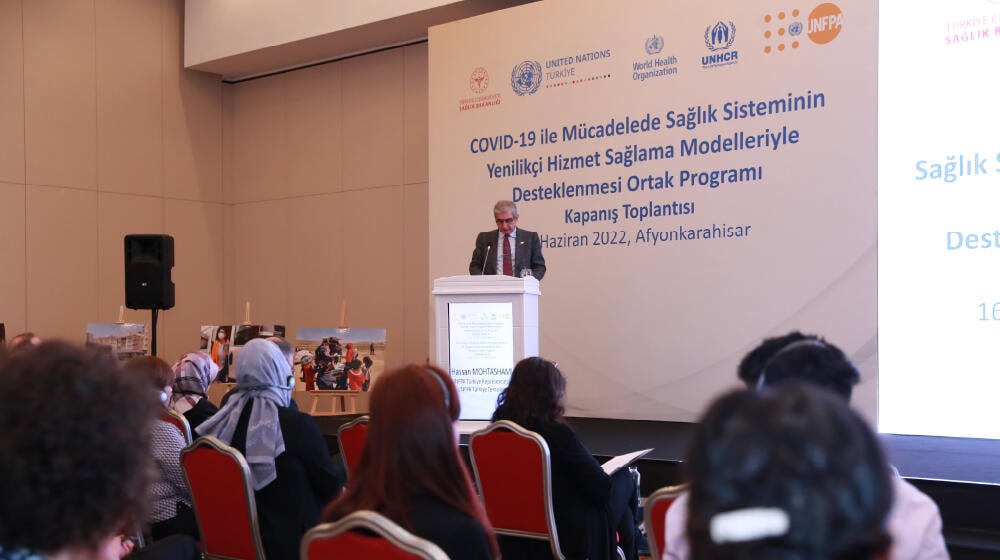Türkiye, with a total number of 17,543,136 cases, ranks 10th in the world among the countries most affected by the COVID-19 pandemic. As of March 2021, the United Nations Türkiye team has supported responding to the demands and needs arising during the pandemic process in coordination with the Ministry of Health, within the scope of the "Promoting Innovative Service Provision Models to Support COVID-19 Health System Response Joint Programme". With the programme, carried out by the United Nations Population Fund, UNFPA Türkiye, more than 60 thousand people were provided with filiation, vaccine and treatment services in addition to prenatal and postnatal care, maternal and child health and reproductive health consultancy services within the scope of combating the pandemic.
As of January 12, 2021, Türkiye was ranked 7th among the countries affected by the COVID-19 pandemic, with more than 2 million 346 thousand COVID cases and 23,152 deaths. As reproductive health is also a critical public health issue during epidemics, and safe pregnancies and births depend on well-functioning health systems and strict adherence to COVID-19-related precautions, the United Nations Türkiye has launched a task force to support the Government of Türkiye's pandemic response.
“Promoting Innovative Service Provision Models to Support COVID-19 Health System Response Joint Program'' was run by UNFPA, in cooperation with WHO and UNHCR, with the support of the United Nations Trust Fund and in coordination with the Ministry of Health from March 2021 to June 2022. In the scope of combating the pandemic; the program was aimed to improve access to basic needs such as immunization and antenatal and postnatal care, prevention and treatment of infectious diseases and routine maternal and child health services, and other health services linked to the COVID-19 pandemic.
As a part of the joint program, UNFPA established mobile health service units in Ankara and Konya to increase the access of groups with specialized needs to health services. 10 mobile health units, consisting of 10 nurses and midwives, 10 translators, and 10 drivers, provided more than 155,000 services to 60,405 people in the fields of vaccination, filiation, prenatal and postnatal care, maternal and child health, and family planning consultancy.
In this context, about 22,000 COVID-19 vaccines were administered, of which approximately 2,000 were to pregnant women. Counseling services were provided to 11,120 pregnant women, and 7,000 home visits were made regarding risky pregnancies. In addition, with the coordination of the District Health Directorates in Ankara and Konya, pregnancy classes were organized to increase awareness of pregnant women on the COVID-19 pandemic, prenatal and postnatal care, and family planning.
Within the scope of the program, sexual and reproductive health services, including safe motherhood and family planning counseling for pregnant women and new mothers, were provided to 18,443 people. Worked with Migrant Health Centers to reach groups with relatively difficult access to services, regular visits to seasonal agricultural workers, and health and social support services were conducted.
The closing event of the project was held on 16 June 2022 in Afyonkarahisar with the participation of the United Nations Türkiye Resident Coordinator Alvaro Rodriguez, UNFPA Türkiye Representative Hassan Mohtashami, and Ministry of Health Deputy Director-General of Public Health Muhammet Çömçe as well as managers from the central and provincial organizations of the Ministry of Health.
About UNFPA:
The United Nations Population Fund advocates for human rights for all, bodily integrity and bodily autonomy including fertility. UNFPA's goal is to achieve a world where every pregnancy is wanted, every childbirth is safe, and every young person can fulfill their potential. For this purpose, it works to end preventable maternal deaths, end the unmet need for family planning and end gender-based violence, and all forms of harmful practices, especially for women, girls, and vulnerable groups.


